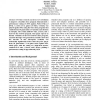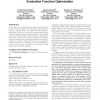56 search results - page 3 / 12 » The Anatomy of Chess Programs |
CG
2006
Springer
14 years 1 months ago
2006
Springer
While recently the strength of chess-playing programs has grown immensely, their capability of explaining in human understandable terms why some moves are good or bad has enjoyed l...
CIG
2005
IEEE
14 years 3 months ago
2005
IEEE
Previous research on the use of coevolution to improve a baseline chess program demonstrated a performance rating of 2550 against Pocket Fritz 2.0 (PF2). A series of 12 games (6 wh...
ACG
2009
Springer
14 years 4 months ago
2009
Springer
Retrograde analysis is a tool for reconstructing a game tree starting from its leaves; with these techniques one can solve specific subsets of a complex game, achieving optimal pl...
GECCO
2008
Springer
13 years 11 months ago
2008
Springer
In this paper we demonstrate how genetic algorithms can be used to reverse engineer an evaluation function’s parameters for computer chess. Our results show that using an approp...
ACG
2009
Springer
14 years 1 months ago
2009
Springer
Endgame heuristics are often incorperated as part of the evaluation function used in Chinese chess programs. In our program, Contemplation, we have proposed an automatic strategy t...


